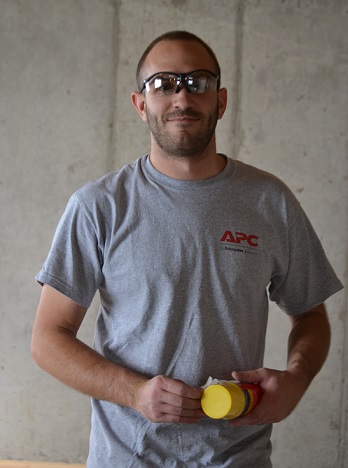
Name Brian Groark
- Education Master of Architectural Engineering, Bachelor of Architectural Engineering from Pennsylvania State University
- Target Audience Undergraduate

We live, work and go to school in buildings, but most of us don't spend time thinking about how these architectural feats are constructed. People like Brian Groark, Electrical Construction Senior Project Manager, provide the nuts and bolts that go into the buildings we rely on. Stay tuned to see why Brian has such a cool job!
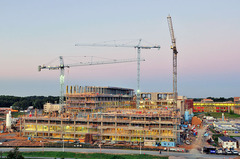 I am a Senior Project Manager for Truland Systems Corporation, an electrical construction company based in the Washington, DC area. Truland is the 9th largest electrical contractor in the US. We design, build, and maintain power distribution, lighting, fire alarm, voice/data/video, and electronic security systems for data centers, laboratories, hospitals, government facilities, railways, and universities.
I am a Senior Project Manager for Truland Systems Corporation, an electrical construction company based in the Washington, DC area. Truland is the 9th largest electrical contractor in the US. We design, build, and maintain power distribution, lighting, fire alarm, voice/data/video, and electronic security systems for data centers, laboratories, hospitals, government facilities, railways, and universities.
Within the company, I manage various projects and oversee the day-to-day operation of jobs to ensure that we are sticking to our timeline and budget. I also work closely with our labor forces to make sure that they have the information, equipment and materials they need to get their jobs done. I start on projects in the early stages, when they are first being designed, and bid all the way through the close-out of projects, when the building is complete and we turn it over to the owner and occupants.
I have always been interested in construction. As a kid my favorite toys were always trucks and construction backhoes. I was curious about how buildings are constructed, what materials were used to build them and how they ultimately come together.
I chose to pursue an Architectural Engineering degree at Penn State because this program focuses on the engineering that goes into building construction. During my education I learned about all aspects of construction operations; I learned about foundation design, earthwork, concrete, steel, HVAC and the overall process that makes the construction of a building possible. Electrical work is also a part of this program, so it gave me a background that is helpful in my job.
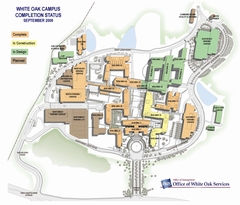 Every day is different and requires a number of different skills. Problem solving features heavily in what I do, as I am constantly presented with new issues that require a solution. On any given day I could be responsible for addressing a request for information (RFI), coming up with planning solutions or assessing constructability issues. In addition to overseeing a project's "big picture", I also manage the day-to-day tasks that come with a management position. Constructing a building takes a lot of work and coordination, and many of my daily tasks require that I collaborate with other project managers, field personnel, general contractors, engineers and architects to get the job done right.
Every day is different and requires a number of different skills. Problem solving features heavily in what I do, as I am constantly presented with new issues that require a solution. On any given day I could be responsible for addressing a request for information (RFI), coming up with planning solutions or assessing constructability issues. In addition to overseeing a project's "big picture", I also manage the day-to-day tasks that come with a management position. Constructing a building takes a lot of work and coordination, and many of my daily tasks require that I collaborate with other project managers, field personnel, general contractors, engineers and architects to get the job done right.
Every day in my job is rewarding. It's great to find solutions to the issues that arise and to see these solutions implemented into the construction of the building. I also really enjoy finding new ways to do things, like identifying how we can improve the efficiency of the labor and the materials we use on a project. It's great to drive by a building years after it is finished and know that I helped transform it from a hole in the ground to a building. In a way it is like having a monument to the team's successes.
I have always liked math and science, and I liked learning how the things around me worked. I think this a big part of why I ended up in this field. Physics was my favorite class because it explains how the physical world works and why things do what they do. Although I was first introduced to physics in high school, in early grade levels I always had an interest in science.
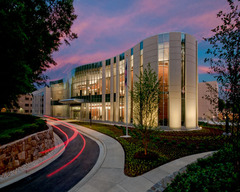 I have always enjoyed construction and applying science to building and construction. I remember walking through malls as a kid and noticing that the floors were made out of something different than wood. I knew that the floors of houses were built out of wood, so this difference intrigued me and clued me into the fact that buildings could be built differently from each other.
I have always enjoyed construction and applying science to building and construction. I remember walking through malls as a kid and noticing that the floors were made out of something different than wood. I knew that the floors of houses were built out of wood, so this difference intrigued me and clued me into the fact that buildings could be built differently from each other.
Getting my degree was definitely the hardest part of my journey. I decided early on to do a dual bachelor's and master's program, so I was still in school while the rest of my friends were graduating and entering the work force.. I enjoyed the classes in my program, but they were definitely a lot of work.
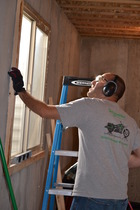
Penn State has a great integrated program that allows students to get both their bachelor's and master's degrees in five and a half years. I participated in this program and it was a great fit for me. I don't know if there are other programs like this that exist around the country but it would definitely be worth looking into. One of the great things about this field is that it really is something you can do anywhere in the world. There are definitely hubs around the US for construction, particularly around major cities, so if you're looking for a position like mine, you'll probably find the most opportunities near a major city.

(source: http://www.sciencekids.co.nz/sciencefacts/engineering/buildings.html)
Earthwork: Excavation and piling of earth in connection with an engineering operation.
HVAC: Heating, ventilation and air conditioning.
General Contractor: A person who contracts for and assumes responsibility for completing a construction project.
Labor Forces: The electricians and personnel who physically work in the field to complete a construction project.
Request for Information (RFI): A standard business process used primarily to gather information in order to know which steps to take next.
(sources: dictionary.com and ask.com)
Why did you choose your major? Did you always know this is what you wan…
Lisa Ingham excels on the field and in the classroom as an Engineering …
Why did you choose your major? Did you always know this is what you wan…